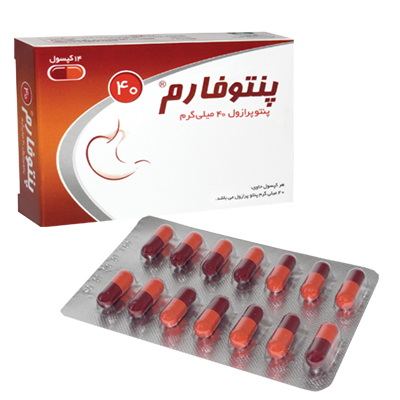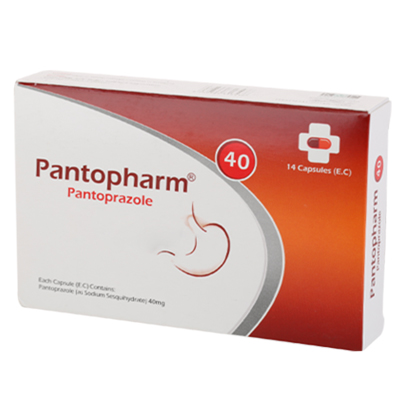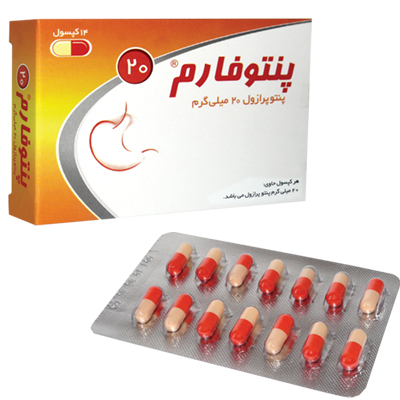Description
Pantoprazole capsule is one of the oral medications prescribed by a specialist doctor to treat digestive problems. Pantoprazole capsule is produced in doses of 20 mg and 40 mg by Kish Medipharm Pharmaceutical Company and is formulated from the raw and active ingredients of pantoprazole. Pantoprazole capsule is considered a class of antiulcer drugs and reduces stomach acid. The mechanism of action of the pantoprazole gastric tablet is as a proton pump inhibitor, affecting the mechanism of hydrochloric acid production in the stomach. Proton pump inhibitors are located in the parietal cells of the stomach and stop the production of hydrochloric acid by inhibiting the H⁺/K⁺ ATPase pump (which is a potassium hydrogen pump in the parietal cells of the stomach). Pantoprazole capsule acts as a prodrug that, after contact with stomach acid, is converted into the active substance cyclohexyl sulfonamide and performs the inhibitory effect.
Pantoprazole is available worldwide in various forms including: oral tablets, oral capsules, enteric-coated tablets, delayed-release capsules, injectable solutions, oral suspension granules, and powder for oral suspension.
The advantages of pantoprazole gastric tablets compared to other proton pump inhibitors include:
- Greater effectiveness: It has stronger antisecretory effects compared to other drugs in the same class.
- Longer half-life: Pentopharm has a longer half-life of 1 hour than esomeprazole and 3 hours than lansoprazole.
- Reduced likelihood of drug interactions: Due to its lower metabolism by the CYP2C19 enzyme, Pentopharm causes fewer drug interactions.
- Fewer side effects: Pantoprazole gastric tablets have fewer side effects compared to other drugs in its same category.
- More flexible administration: Since pantoprazole is produced in different forms and is more convenient to administer, it is suitable for patients with swallowing problems.
Controlling symptoms in chronic diseases, healing ulcers caused by stomach acid, and rapid relief of symptoms are other benefits of pantoprazole stomach tablets.
When to take Pantoprazole tablets
When to take Pantoprazole tablets is one of the most common questions that patients always ask. Taking Pantoprazole tablets at a fixed time of day ensures that the effect of the drug is uniform throughout the day. The best time to take Pantoprazole tablets is half an hour to an hour before breakfast, which can be taken with a meal or a glass of water. Contrary to popular belief, if this medicine is taken immediately before breakfast, its effectiveness will be reduced, and the correct way to take it is only on an empty stomach and not to eat for at least half an hour after that. Just be careful not to chew Pantoprazole tablets under any circumstances. Given that taking this medicinal product may cause dizziness, it is better not to use it while working with sensitive devices or driving.
Uses of Pantoprazole tablets
A specialist doctor usually prescribes medications after monitoring and observing the individual's condition. Pharmaceutical products are recommended for the purpose of improving, treating, and preventing diseases. One of the most widely used medications for digestive problems is the stomach tablet Pantoprazole, which we will mention in more detail below:
- Gout treatment
- Gastroesophageal reflux disease (GERD)
- Treating symptoms of dyspepsia (indigestion)
- Nocturnal Acid Breakthrough
- Helicobacter pylori infection
- Duodenal ulcer, stomach ulcer and duodenal ulcer (peptic ulcers)
- Zollinger-Ellison syndrome (excessive stomach acid production)
- Prevention of bleeding from gastric ulcers in hospitalized patients Stress in patients admitted to the ICU
- Prevention of stomach ulcers caused by nonsteroidal anti-inflammatory drugs or antithrombotic drugs
Contraindications for Pantoprazole gastric tablets
Although medicines are produced to treat and improve the health of the community, it has been proven in medical science that not all medicines are suitable for all people. Age, gender, health conditions, medications taken, genetics and allergies can be among the influential factors in choosing pharmaceutical products. So it is true that many medicines are available, but in principle, a specialist doctor should consider the prescribed medicine, dosage and best time for use after treating and examining your condition.
Pantoprazole stomach tablets are one of these rules, which are not recommended for all people and are recommended based on expert observations. Remember, you should never recommend a medication that has been prescribed to you to others. Below, we will mention some of the contraindications for using Pantoprazole stomach tablets:
- Hypersensitivity to pantoprazole, any of the ingredients of Pentopharm, or other proton pump inhibitors
- Concomitant use with some medications, alcohol and its derivatives, grapefruit and its juice
- Having a history of bone fractures and osteoporosis
- Low blood magnesium levels (hypomagnesemia)
- People with severe liver and kidney failure
- Systemic lupus erythematosus (SLE)
- History of severe allergic reactions
- People with vitamin B12 deficiency
- Infants less than 1 year old
- Pregnancy and breastfeeding
- Severe pancreatitis
- Acute anemia
Drug interactions of pantoprazole tablets
Drug interactions can occur when multiple drugs are taken at the same time and can increase or decrease the effectiveness of a drug. Drug interactions can affect how the drug is absorbed and excreted, how it is metabolized, and how well it works. The type of drug, the dosage, the duration of use, and the patient's health status are some of the conditions that can cause problems. Pantoprazole, or Pentopharm, stomach tablets interact with some drugs. Here are some of the drugs that have caused problems with Pentopharm:
- Drugs that require an acidic environment such as ketoconazole, etribuzol and itraconazole, ampicillin, erlotinib and atazanavir
- Nonsteroidal anti-inflammatory drug products such as ibuprofen and naproxen
- Protease inhibitor drugs such as atazanavir, nelfinavir, and darunavir
- Immunosuppressant drugs, including methotrexate
- Diuretics or water pills, such as furosemide
- Antidepressants, including diazepam
- Blood anticoagulants such as warfarin
- Alcoholic beverages and their derivatives
- Antiplatelets such as clopidogrel
- Anticonvulsants such as phenytoin
- Heart medications such as digoxin
- Some painkillers, such as Tadon
- Grapefruit and its juice
- Iron
Side effects of pantoprazole stomach tablets
As mentioned, medications are not suitable for everyone and can cause irreparable problems for various reasons, including drug interactions. Paying attention to the doctor's recommended tips and disclosing all your current conditions can be of great help in their prescription and prevent these unwanted problems as much as possible. The most common side effects of Pentopharm are summarized below:
- Digestive disorders (nausea and vomiting, abdominal pain, diarrhea and constipation)
- Allergic reactions (itching, swelling and inflammation, redness and hives)
- Osteoporosis and fractures with long-term use
- Dizziness, headache, drowsiness, and feeling tired
- Insomnia and sleep problems
- Respiratory problems (asthma and shortness of breath)
- Inflammation in the intestines and stomach
- Upper respiratory tract infection
- Increased skeletal muscle tone
- Reduced absorption of vitamin B12
- Pain in the chest area
- Increased salivation
- Ana phylactic shock
- Arrhythmia multiforme
- Neck pain
- Dry mouth
- Skin rash
- Tinnitus
- Pharyngitis
- Rhinitis
Important points about Pantoprazole or Pantoprazole gastric tablets
The most important points you should pay attention to regarding the use, dos and don'ts, storage, and conditions of each medicine are usually in the medicine box. Therefore, it is always recommended to keep the medicines in their box. Consulting a specialist doctor and pharmacist can be of great help in resolving your doubts about pharmaceutical products. Below are some important points you should know about Pantoprazole stomach tablets:
- Pantofarm capsules should be stored at a temperature below 30°C, away from sunlight. Avoid freezing and contact with moisture.
- All medicinal products should be kept out of the reach of children.
- Pentofarm is supplied in a 14-count blister pack with an instruction sheet inside the box.
- Pantoprazole gastric tablet is classified as pregnancy category B and there is no sufficient study on its secretion into breast milk. Be sure to consult your specialist before using the medication during pregnancy and breastfeeding.
- The safety and effectiveness of this medicinal product in children has not yet been proven.
- The dosage of each medication is determined by the treating physician. Usually, in adults, the recommended dosage is 20 mg to 40 mg of Pentopharm once a day for 4 to 8 weeks.
- If you forget to take a dose, take Pantoprazole as soon as you remember. If it is almost time for your next dose, skip the missed dose and go back to your regular schedule. Avoid doubling or skipping a dose, as this can cause unwanted side effects.
- Swallow the Pantofarm capsule whole and avoid crushing or opening it.
- If you are prone to or suffer from zinc deficiency, you can use zinc supplements after consulting your doctor.
- Before starting treatment with pantoprazole stomach tablets, you can take antacids for a few days after consulting your doctor.
- Using pantoprazole gastric tablets may cause interference with the results of some tests.
Conclusion
Pantoprazole is one of the treatment solutions for digestive problems. This pharmaceutical product is produced and sold by Kish Medipharm Company in doses of 20 mg and 40 mg in a 14-count blister under the trade name Pantopharm. In the minds of the general public, this drug is known as Pantoprazole gastric tablet, but you should remember that Pantoprazole is formulated in different formats to facilitate patient consumption and is recommended for diagnosis by the treating physician.
In general, Pentopharm is known for treating stomach ulcers, preventing and treating gastroesophageal reflux, treating excessive stomach acid secretion, and treating peptic ulcers.





Reviews
There are no reviews yet.